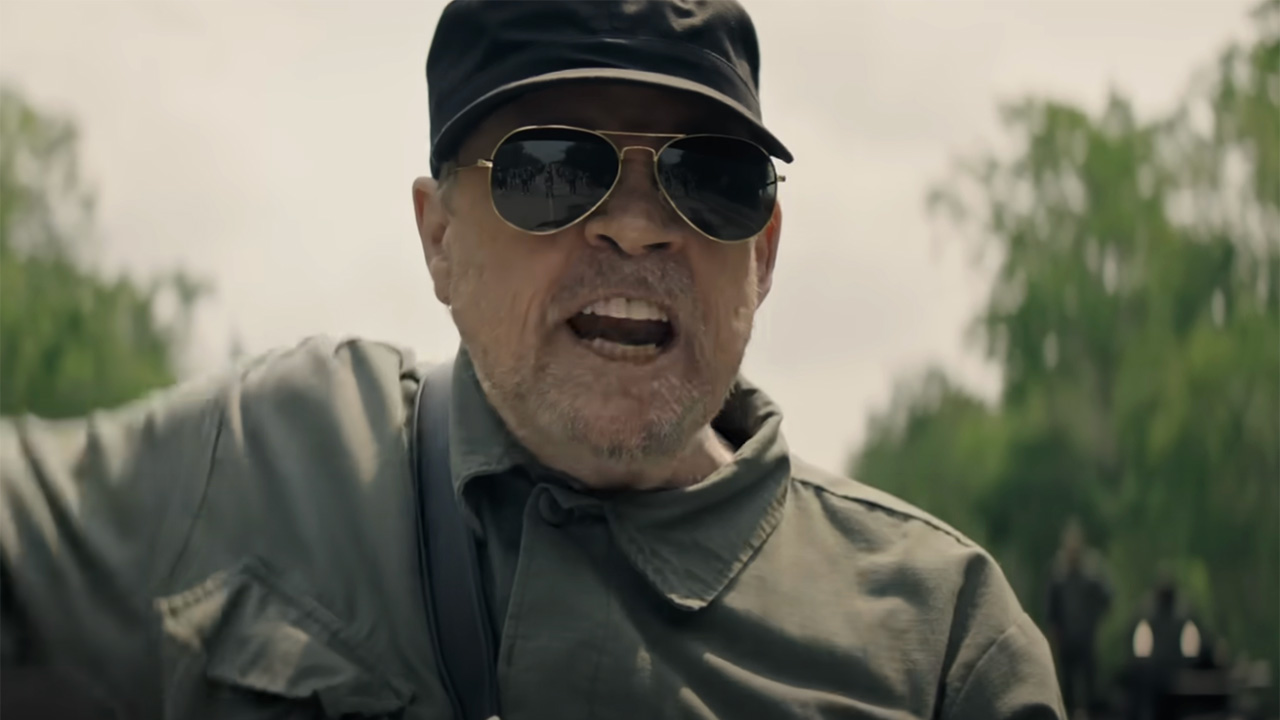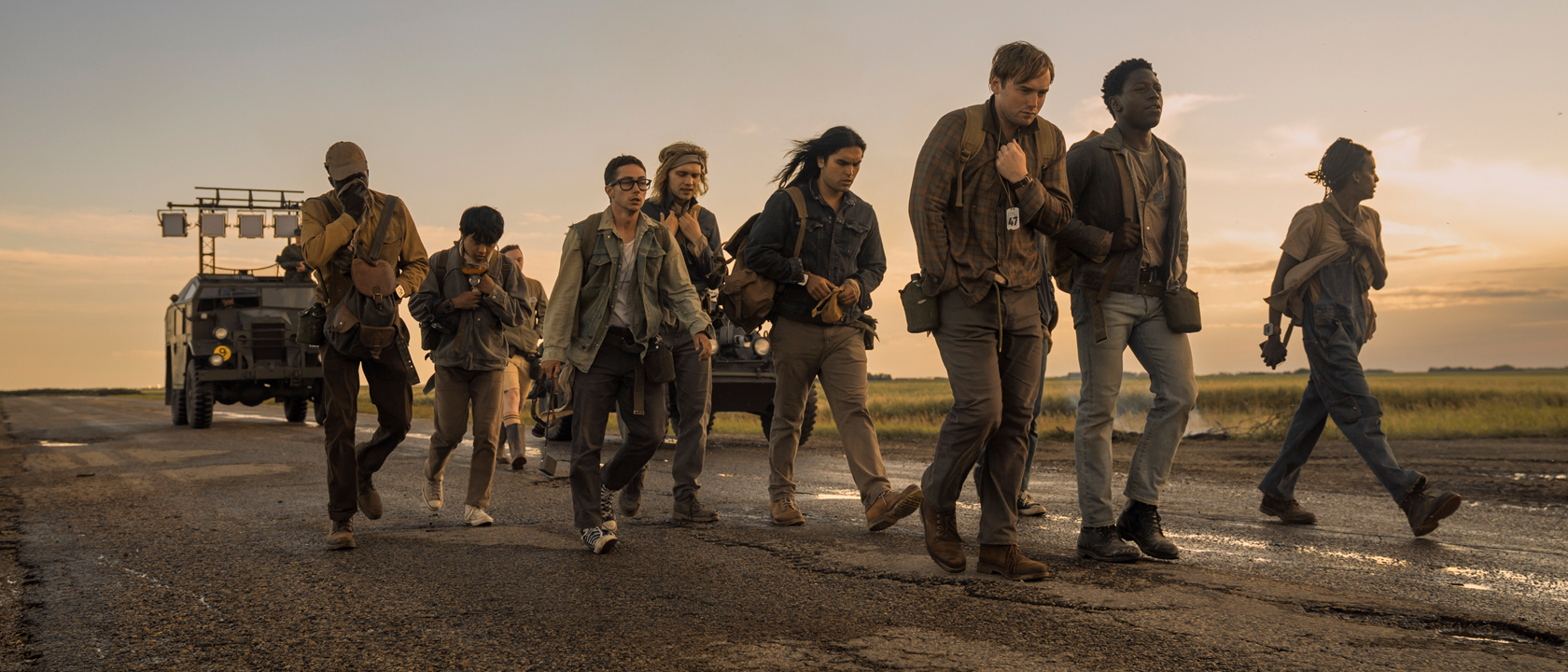Per Frank Darabont’s commentary track for The Mist, Stephen King had instant appreciation for the now-infamous ending of the 2007 film – which is notably way more extreme than what is featured in the King novella on which it’s based. In an email, the legendary author wrote to Darabont, “Every generation needs a movie like Night of the Living Dead where nothing turns out well for anybody at the end.” Happy conclusions are a dime a dozen on the big screen, hence the coinage of the phrase “Hollywood ending.” But whether we like it or not, bleakness is a part of life, and there is a certain responsibility for art to reflect that hard reality.

Release Date: September 12, 2025
Directed By: Francis Lawrence
Written By: JT Moller
Starring: Cooper Hoffman, David Jonsson, Tut Nyuot, Ben Wang, Garrett Wareing, Charlie Plummer, Judy Greer, and Mark Hamill
Rating: R for strong bloody violence, grisly images, suicide, pervasive language, and sexual references
Runtime: 108 minutes
Eighteen years after the theatrical release of The Mist, another Stephen King movie has been crafted to further that tradition – though Francis Lawrence’s The Long Walk is also a very different animal. Unlike the Darabont film, there is no shock from the unfurling tragedy, as the adaptation in this case not only stays faithful to the source material, but more importantly commits to the promise that’s made in the opening scenes. Whether you’re familiar with the book or not, there is no excuse not to be emotionally prepared for the experience that is unleashed in the story as the young protagonists participate in a death march that can only have one winner/survivor. And yet, there is no amount of preparation actually possible that can get you ready for the blow that this exceptional and powerful new movie delivers.
The Long Walk is a work that I view through a kind of masochistic lens. The Stephen King book (the first novel he ever completed, which was originally published under his Richard Bachman pseudonym) is one of my favorites in the author’s canon, and I’ve spent years fascinated and hopeful that it could someday shirk its reputation as “unfilmable” and be brought to the big screen in all of its bleak glory. In the wake of watching Lawrence’s adaptation, a knot tied firmly in my guts, I wondered why I was so excited to feel so miserable. And yet, I’m in absolute awe of the film’s audacity and execution. It’s modern cinema at its most hardcore.
Set in a not-too-distant future that has seen America struggling in the wake of a high-toll war, the film begins as 50 teenagers are selected from around the country (one from each state) to take part in the title competition. Each contestant must maintain a speed of three miles per hour, and if they slow down, they receive a warning. While walking for one hour straight can clear one warning, collecting three warnings means losing, and losing means being executed by one of the soldiers constantly monitoring the action.
We follow the horrific journey with Ray Garraty (Cooper Hoffman), who is the “lucky” contestant to be competing in his home state. Along the way, he develops complicated relationships with his fellow walkers, creating a friend group dubbed the “Musketeers” with Peter McVries (David Jonsson), Arthur Baker (Tut Nyuot), and Hank Solson (Ben Wang). With the game’s organizer, the fascistic The Major (Mark Hamill), occasionally driving by with amplified rants about patriotism and sacrifice, the boys bond by talking about the world, their lives and their dreams of what they’ll do with the grand prize: great riches and the granting of a single wish. But there can only be one winner, and as days pass and number of contestants dwindles, the stakes never stop escalating.
Brilliant character development is key to The Long Walk's ultimately simple story.
There are two principal reasons why The Long Walk developed a reputation as “unfilmable,” and the first concerns the story’s unflappable commitment to a single action, which is the characters walking. The novel is written with a third person perspective, but it never strays from Ray Garraty’s side, and there are no side-plots or breaks from the eponymous competition. JT Mollner’s screenplay doesn’t commit in the same way, as there is a fractured dream sequence that precedes a flashback, but those moments are the exceptions, and it’s spectacular how one can be spellbound by the simplicity.
A foundation of Stephen King’s storytelling is that any narrative can be compelling if the reader cares about the characters, and that’s The Long Walk’s secret weapon. Some of the teens opt for silence and to focus on the competition (like Garrett Wareing’s mysterious Stebbens), and others opt to play the heel card (like Charlie Plummer’s antagonistic Barkovitch), but the movie is mostly about a group of young people who just try and get along and share their personal stories as they march. They joke together and they struggle together moving toward what is an almost inevitable death. And while the rules of the game never change, the stakes are ever-escalating as the audience can’t help but get invested and not want to see fate met.
Your Daily Blend of Entertainment News
There are no weak links in the Long Walk cast, but David Jonsson is a remarkable scene-stealer.
We care about the protagonists because the movie finds ways for us to connect with them and for us to understand their humanity – but charm and charisma play a role as well, and the full ensemble cast of The Long Walk is impeccable. Cooper Hoffman instantly demonstrated himself as a terrific talent a few years ago with his outstanding big screen debut as affable go-getter Gary Valentine in Paul Thomas Anderson’s Licorice Pizza, and he solidifies his young reputation with gripping work as Ray Garraty, who hides a traumatized soul behind his efforts to connect with the other walkers and help those who suddenly find themselves stacking up warnings.
Hoffman’s work is powerful, and I could highlight outstanding aspects of all the film’s performances (special shout out to Judy Greer, who, in limited screen time as Ray’s mom, brought me to tears), but I can guarantee that the turn that everyone is going to be talking about coming out of the movie is David Jonsson as Peter McVries. I’ve been well aware of the English actor’s talents since his lead turn in Raine Allen-Miller’s tremendous 2023 romantic drama Rye Lane, and we are now just a little over a year removed from his scene-stealing work in Fede Álvarez’s Alien: Romulus, but he has never been better than what he’s doing here.
As the walk continues, Peter is revealed as the soul of the film – a good kid who comes from nothing and makes an honest go at perpetual optimism in a life of cruelty – and Jonsson’s emotional journey is perfection.
The Long Walk is a film where being shocking is part of the point, and Francis Lawrence delivers in all areas.
Of course, reflecting the cruelties of fascistic power and systemic abuses of younger generations is a vital point of The Long Walk, and in its depiction, Francis Lawrence’s direction is fearless. The second principal reason why King’s story was long believed unfit for the big screen was because of the belief that no studio would support the creation of such a punishing film for wide release, but there are zero punches pulled it. It would be a betrayal of the themes of the story for the adaptation to flinch when it comes to its depictions of violence, and Lawrence lets audiences know the score early on when a walker pulls up lame with a charley horse and collects three warnings. There is no cutaway as a soldier’s bullet fires down through the side of the boy’s head and out of his cheek, the force of the projectile causing his neck to jerk.
The bold presentation of the executions is one key choice, but the visceral nature of The Long Walk isn’t limited to the shocking eliminations. The fatal consequence of losing is horrific, but not to be ignored is that the entire competition is a variation of torture, and the presentation of the toll it takes on the characters is affecting (a fascinating aspect of telling this story is that there is no way of getting around having performers walk for miles and miles and miles throughout production, and it’s very much reflected in the physicality).
Everything from walkers getting bloody injuries to letting out exasperated cries of anguish to even defecating is part of the hard-to-stomach ordeal, and even movie-goers with the weakest tolerance of such extremes will be able to appreciate the fortitude in the filmmaking.
I imagine that the experience of The Long Walk for audiences ignorant of the source material will be similar to how I felt while having my own bleak cinema baptism with Stanley Kubrick’s Paths Of Glory. I will never forget watching that classic movie and my brain protecting me with the thought, Kirk Douglas is surely going to make some kind of heroic last minute move and this travesty of justice will not reach its darkest conclusion. And then the soldiers were lined up and executed by firing squad. It left me agog with a powerful reminder of the very real darkness of our world. We need those reminders in our art or everything is just diversion.
The new King adaptation isn’t on the same level as Kubrick’ iconic film and (not to mention the story is a few steps removed from reality as dystopian fiction vs. a cinematic recounting of the Souain corporals affair), but it inspires the same species of intestinal turmoil. It confronts you about the way in which our society has a propensity for exploiting youth while ignoring the consequences, and that’s as true today as it was during the Vietnam War when the novel was initially written. It’s a statement that Francis Lawrence previously made with his Hunger Games movies, but he full-throatedly screams it with The Long Walk, and it’s unforgettable.

Eric Eisenberg is the Assistant Managing Editor at CinemaBlend. After graduating Boston University and earning a bachelor’s degree in journalism, he took a part-time job as a staff writer for CinemaBlend, and after six months was offered the opportunity to move to Los Angeles and take on a newly created West Coast Editor position. Over a decade later, he's continuing to advance his interests and expertise. In addition to conducting filmmaker interviews and contributing to the news and feature content of the site, Eric also oversees the Movie Reviews section, writes the the weekend box office report (published Sundays), and is the site's resident Stephen King expert. He has two King-related columns.
You must confirm your public display name before commenting
Please logout and then login again, you will then be prompted to enter your display name.

